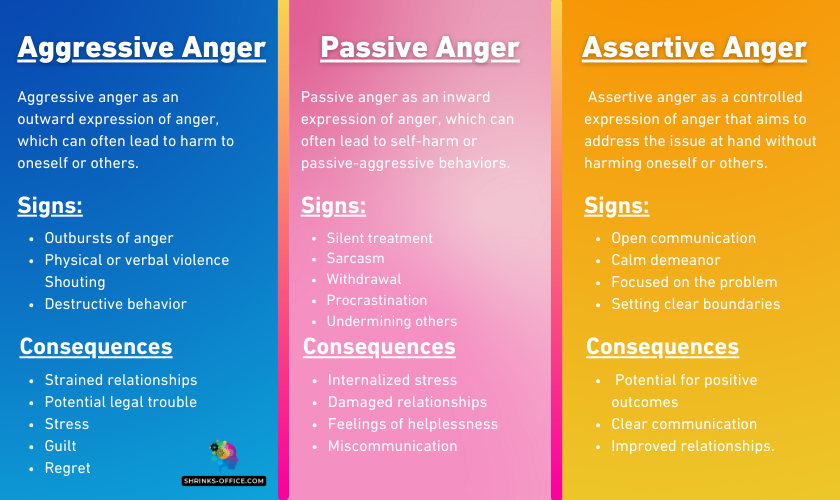Discover effective ways to heal from the emotional trauma of verbal abuse. Learn how to protect your self-worth, set healthy boundaries, and seek professional support to overcome the lasting effects of emotional abuse.

- Understand your emotional triggers in your quiet timeu003cbru003e- Don't take things personally u003cbru003e- Practice deep breathing for a few momentsu003cbru003e- Take a timeoutu003cbru003e- Focus on the solution, not the problem
It could be with a person, friend, co-worker, or in a room full of people. It's easy to burst into anger when upset about a matter. However, after a few moments, you begin to regret the actions you took out of frustration and start doing damage control. Keep in mind you're not alone. A lot of people struggle with their temperament. So, how do you maintain your temper and remain calm in uncomfortable situations?
We'll also discuss the various forms of rage people express today and the benefits of counseling.
Helpful tip
Remember, uncontrolled rage breeds regret. Know how anger damages relationships and learn to express feelings calmly for harmony's sake.
Losing your temper is a normal part of life, but it doesn’t have to be an uncontrollable problem. Once you understand your emotional triggers, you become more intelligent to act instead of react. [1]
It can be helpful to keep track of your triggers in a journal or on your phone. Write down the situations that make you uncomfortable and then think through them.
Once you know your triggers, you can start developing strategies for managing them. For example, if you know being around certain people tends to make you angry, you can take a break and walk away before your temper gets the best of you.
Helpful tip
Dive beneath the 'anger iceberg' to understand its roots. Explore unseen emotions causing anger to better manage reactions and foster peace.
One of the main causes of feeling angry is taking things personally. This happens because of childhood trauma, poor self-esteem, or when we make assumptions about other people's motives and intentions. According to research, keeping calm and taking a step back to see the issue objectively will have a more positive outcome. Also, it's vital to reassess your relationship with someone if you realize they are actively attempting to hurt your feelings. [2]
Deep breathing is an incredibly effective way to relieve stress when you’re feeling overwhelmed. Not only does it slow your heart rate, it also provides a powerful mental refocus and can help you respond more thoughtfully in tense situations. [3]
When you start to feel that familiar wave of anger, try pausing for a moment and reflecting on your breathing. Taking slow breaths from your diaphragm can help release the tension and frustration building up in your body. It may not feel easy at first, but you will regain control of your emotions with some practice. [3]
"Timeout!" Basketball players use it as a little break to unwind and rethink their next play. [4]
Taking a timeout allows you to gain control of your emotions before they get out of hand. Research shows that stepping away from the situation can help prevent negative outcomes. [5]
Depending on the situation, there are several different ways to take a timeout. If you're in a public place, moving to a private area can relax your nerves. Also, you could take a walk around the block or find a quiet time in nature to clear your head. Just five minutes of being away from the situation can be enough for you to regain composure.
Focusing on the solution helps you stay calm and keep perspective. It helps you avoid getting sucked into a pointless argument.
Try to concentrate on the most practical and efficient approach to solving the current problem. This doesn’t mean ignoring or brushing the problem aside but instead focusing your energy and time on finding an appropriate solution.
Did you know?
Hitting yourself when angry can be harmful. Instead, practice mindfulness and calming techniques to cope with intense emotions healthily.

Arguments between spouses are inevitable, but losing your temper doesn't have to be. With the right approach and understanding, you can express your opinions and feelings without letting anger get the best of you. Here are some unique and creative strategies to keep calm when disagreements arise with your wife.
Firstly, recognizing what triggers your anger is vital. Is it when you feel unheard or dismissed? Perhaps it's when you feel disrespected or unappreciated. Recognizing these triggers can help you manage your reactions more effectively.
Try to understand your wife's perspective during disagreements. Empathy can help defuse your anger and make your spouse feel heard and understood.
Communicating your feelings using 'I' statements can help prevent defensiveness and promote understanding. For example, instead of saying, "You never listen to me," try saying, "I feel ignored when I share my thoughts, and it upsets me."
If you feel your anger escalating, it's okay to take a time-out. This break can give both you and your wife time to cool down and gather your thoughts.
If your anger continues to be an issue despite your efforts, it may be worth seeking professional help. A qualified therapist can provide tools and techniques to help you manage your anger more effectively.

Parenting can be a challenging journey, filled with moments that test your patience. But it's essential to remember that your reactions can greatly impact your children. Here are some creative and practical strategies to help you maintain your cool even in the most trying situations with your kids.
Before you correct your child's behavior, make an effort to connect with them. Understanding their perspective can help you respond more empathetically.
Humor can be a great tool to diffuse tension. It can also help your child see the lighter side of things, making it easier to discuss the issue at hand.
As a parent, you're the first role model your child has. By demonstrating how to manage emotions, you're teaching your child to do the same.
Children may act out when they're unsure of what's expected of them. Clear boundaries and expectations can help minimize these situations.
Parenting can be draining, both physically and emotionally. Practicing self-care can help you remain calm and patient.

Siblings often share a unique bond, but it can sometimes be punctuated by disagreements and conflicts. When emotions run high, it can be challenging to keep your cool. Here are some distinctive strategies to prevent losing your temper when interacting with your sibling.
Effective communication can prevent many conflicts. Aim to express your thoughts clearly and listen actively to your sibling's perspective.
Understanding your own emotions and those of your sibling can help manage disagreements better. This is where emotional intelligence comes into play.
Harboring grudges can often lead to explosive confrontations. Learning to forgive and let go of minor issues can lead to healthier interactions.
Boundaries are essential for maintaining healthy relationships. They help to ensure respect between individuals and prevent resentment.
If conflicts with your sibling become too frequent or intense, seeking mediation can be helpful. This could be a trusted family member or a professional mediator.

There are three distinct types of anger: Aggressive, Passive, and Assertive. [6]
Consider counseling to acquire better coping strategies if you believe your anger is truly out of control, affecting your relationships and other significant aspects of your life. You can engage with a psychologist or qualified online therapist to develop various approaches for altering your thoughts and actions.
While you're there, ask about their approach to anger management when you first meet with them. Check to be sure this isn't just a strategy to "bring you in touch with your feelings and express them"—that may be the exact cause of your issue.
You can take this quick bipolar test to check if you have bipolar disorder.

Gary, a 33-year-old man, discovered the potential of hypnotherapy through a friend. Despite initial skepticism, he found himself at a point where he had tried everything else to manage his issues without success and decided to give it a shot. His past, marred by childhood bullying and a strict, temperamental father, had left deep emotional wounds. This, combined with physical abuse from an older stepbrother and his experiences as a professional fighter, had made Gary a very angry person.
Even though his stature and strength had grown, his emotional trauma led him to react violently when feeling intimidated or cornered. Multiple charges of assault and attempted murder had led him to therapy and anger management, but these interventions only partially helped, and he inevitably reverted to his old ways.
In a desperate attempt to regain control over his life, Gary contacted Sonya, a hypnotherapist, and arranged a session with her. The meeting with Sonya was an emotional one, and he left feeling exhausted, yet with a sense that something had changed. Sonya provided him with a recorded session to listen to daily, which gradually lifted his persistent feelings of aggression and anger. The change was noticeable to those around him, leading him to make further positive changes in his life.
He began surrounding himself with positive influences, cut ties with negative individuals, and saw improvements in his personal relationships. His transformation, which began with Sonya's session, led him to a place of genuine happiness and calm, much to the relief and joy of his loved ones.
Don't have unrealistic expectations. Learning how to control your emotions and stopping yourself from erupting like a volcano takes practice and patience. It can be helpful to understand what triggers your outbursts, so you can take steps to prevent them from happening in the first place.
Also, try looking into therapy - the benefits of therapy include better anger management, improved communication, and healthier relationships.
By following these tips, you can start to gain control over your temper and become more intelligent in your approach to arguments. With enough practice, you can learn how to argue without losing your temper and find better ways of resolving conflicts.
The answer could be that it’s a combination of factors. It could be that you haven’t taken the time to understand your triggers for anger. Alternatively, it could be that you’re not taking steps to manage your emotions or that you’re relying on unhealthy coping mechanisms. It could also be that you’re unaware of the warning signs of an impending meltdown or don’t know how to manage your emotions effectively.
Arguing without losing your temper is no easy feat, but it can be done. First, realize when you’re feeling heated and take a few moments to pause and collect yourself. Take some deep breaths and try to remember that the other person isn’t attacking you—they just have a different opinion or perspective. Once you’ve taken some time to cool down, focus on communicating your points in a logical, respectful way. Ask questions if you need clarification, and be mindful of how you phrase things—try to avoid inflammatory language or personal attacks.
Discover effective ways to heal from the emotional trauma of verbal abuse. Learn how to protect your self-worth, set healthy boundaries, and seek professional support to overcome the lasting effects of emotional abuse.
Dissociation can be a challenging experience, especially the one that happens at work. Are you experiencing dissociation?...
Discover the best intimacy-building conversation starter cards for couples. Strengthen your bond, spark deep connections, and engage in meaningful conversations with our top picks.
Bionic reading transforms the reading experience for ADHD individuals by guiding the eyes for focus and understanding. Dive into the world of bionic reading.
Dissociation can be a challenging experience, especially the one that happens at work. Are you experiencing dissociation?...
Bionic reading transforms the reading experience for ADHD individuals by guiding the eyes for focus and understanding. Dive into the world of bionic reading.
Explore the complexities of postpartum depression and genetics in our blog 'Is Postpartum Depression Hereditary?' for insights into maternal mental health.
